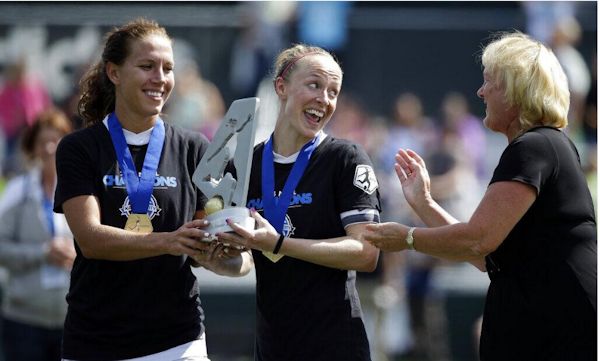Buffalo News
by Rachel Lenzi
October 27, 2023
Greater Buffalo Sports Hall of Fame: Cheryl Bailey's path mirrored rise of Title IX

the NWSL championship trophy after the final in 2014.
This is part of a series profiling the members of the Greater Buffalo Sports Hall of Fame’s Class of 2023.
Southwestern High School didn’t have a girls track and field program in the early 1970s. That didn’t deter Cheryl Bailey from competition. She joined the boys track team as a sprinter.
A few years later, Denison University in central Ohio needed a women’s soccer coach. Bailey took her athletic background and her degree from Slippery Rock University and became Denison’s coach. That opened the door for Bailey, a Jamestown native, to work in athletic administration at the college and professional levels.
Title IX’s impact has been most widely made and recognized in athletics, and it helped propel Bailey into a career in sports administration. She will join the Greater Buffalo Sports Hall of Fame next month as part of its 2023 class. Bailey is one of 12 people who will be inducted, a group that includes Buffalo Bills wide receivers Eric Moulds and Bobby Chandler, and Buffalo Sabres star and executive Gerry Meehan.
“It’s such a great honor,” Bailey said of being a part of the incoming class. “Any time you have the opportunity to be recognized for what you have done, it is always an honor.”
Bailey was one of the original beneficiaries of Title IX, legislation passed into law in 1972 – her junior year at Southwestern – that established gender equity standards and prohibits discrimination on the basis of sex in any federally funded education program or activity.
“I ended up being in the right place at the right time in 1972, when Title IX was passed,” said Bailey, who now lives in Charlotte, N.C. “I had the opportunity to run on the boys track team because they didn’t have a girls team. It was the first time I’d competed. In college (at Slippery Rock), it was the opportunity I had to be part of a girls track and field team.”
At Denison, Bailey coached the first varsity college women’s soccer program – and yet she never played soccer. She also coached track and field, became the school’s athletic director from 1983-1990 and was a professor at the school.
Bailey was the University of Wisconsin senior associate athletic director from 1990-2005, and she directed one of the nation’s prominent Division I women’s athletic programs.
At Wisconsin, she oversaw 22 varsity sports, hired coaches, including Mark Johnson as women’s hockey coach – Johnson was a member of the 1980 United States hockey team that won the gold medal, and the son of legendary Wisconsin men’s hockey coach “Badger” Bob Johnson – chaired the NCAA’s women’s basketball committee and was responsible for the Women’s Final Four, as well as Wisconsin hosting the volleyball and golf national championships.
Her work in college athletic administration led her to international and professional women’s soccer. When she retired from Wisconsin in 2005, former Badgers women’s soccer coach Greg Ryan was the head coach of the U.S. Women’s National Team, and Ryan suggested Bailey as a candidate to become the team’s general manager.
As general manager of the United States Women’s National Team and the first executive director of the National Women’s Soccer League, she took what she learned from more than 25 years in college athletic administration and applied it to working at the professional and international levels of women’s soccer.
With Bailey at the helm from 2007 to 2011, the U.S. won the gold medal at the 2008 Olympics in Beijing, was the silver medalist at the 2011 World Cup and the bronze medalist in the 2007 World Cup.
She was the founding executive director of the NWSL from 2012-15, and fell back on what she learned as Denison’s first women’s soccer coach.
“I’ve had two times in my career where someone handed me a blank sheet of paper and said, ‘Start something,’ and that was at Denison and in professional soccer. I had a lot of help, but the mission was for it to be able to provide great opportunities for women coming out of college.
Her career also paralleled the boom in women’s soccer – its move from one NCAA classification to Divisions I, II and III in the 1980s, and the United States’ rise to becoming a women’s soccer power. Through it, though, she relied on her experience as an educator and as a coach.
“I so believe that sports is a way to educate,” Bailey said. “There are people who maybe can’t do math, or maybe they can’t do certain things, but you put it in a sports playbook, and they can. I’m a fan of the people and the athletes who play a sport, and nothing gives me more pleasure than to watch kids learn and develop and grow.
“The things you learn: teamwork, defeat, working together, how to come back from hard situations, all those things mean a whole lot to me, and it’s what these kids learn and how they grow.”
The additional financial assistance of the community is critical to the success of the Chautauqua Sports Hall of Fame.
We gratefully acknowledge these individuals and organizations for their generous support.











